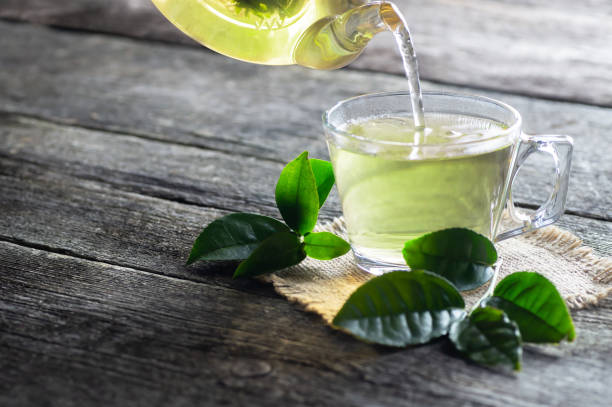Tea, with its rich history and diverse flavors, has garnered attention not just for its taste but also for its potential health benefits, including aiding weight loss.
While there's no miracle drink for shedding pounds, certain types of tea have been associated with properties that can support weight management when combined with a healthy lifestyle. Let's explore five types of tea that may contribute to your weight loss journey.

1. Green Tea

Green tea stands out as a popular choice among those seeking weight loss benefits. Packed with antioxidants called catechins, notably EGCG (epigallocatechin gallate), green tea has been linked to increased metabolism and fat oxidation. These compounds may aid in burning calories and fat, potentially supporting weight loss efforts.
Moreover, green tea contains caffeine, which can provide a mild stimulant effect, potentially enhancing exercise performance and promoting calorie burning during physical activity.
2. Black Tea

Often overshadowed by its green counterpart, black tea also boasts properties that could aid in weight management. Rich in flavonoids, particularly theaflavins and thearubigins, black tea has been associated with improved gut health and potentially supporting weight loss.
These compounds may aid in reducing calorie absorption, enhancing fat breakdown, and regulating metabolism.
Additionally, the moderate caffeine content in black tea can provide an energy boost, potentially aiding in physical activities that contribute to weight loss.
3. Oolong Tea

Oolong tea, a traditional Chinese tea variety, falls between green and black tea in terms of oxidation. This tea contains polyphenols, similar to those found in green tea, and may also support weight loss by increasing metabolism and enhancing fat burning.
Studies suggest that oolong tea could potentially aid in reducing body fat and accelerating weight loss when combined with a balanced diet and regular exercise.
4. White Tea

Known for its delicate flavor and minimal processing, white tea contains high levels of antioxidants, such as catechins, which may assist in weight management.
These antioxidants have been linked to boosting metabolism and encouraging the body to break down fats more efficiently.
Though research on white tea and weight loss is limited compared to other teas, its potential benefits make it a worthwhile addition to your dietary choices.
5. Herbal Teas

While not technically tea (as they are not derived from the Camellia sinensis plant), herbal infusions like chamomile, peppermint, and rooibos offer a caffeine-free alternative with potential weight management benefits. These herbal teas often contain antioxidants and compounds that promote relaxation, reduce stress, and aid digestion.
Reducing stress levels is crucial for weight management as stress can lead to emotional eating and weight gain. Herbal teas' calming properties may indirectly support weight loss efforts by helping manage stress-related eating habits.
6. Pu-erh Tea

Pu-erh tea, originating from China's Yunnan province, undergoes a unique fermentation process, leading to its distinct earthy flavor. This tea contains compounds like theabrownins and catechins, which may aid in weight management by supporting digestion and metabolism.
Some studies suggest that pu-erh tea might help reduce weight gain by promoting the breakdown of fats and inhibiting the production of certain enzymes involved in fat storage.
Regular consumption of pu-erh tea has been associated with improved cholesterol levels and reduced body weight, although further research is needed to confirm these effects conclusively.
7. Matcha
Matcha, a finely ground powder made from specially grown green tea leaves, is renowned for its vibrant green color and potent concentration of antioxidants.
Unlike traditional teas where leaves are infused and removed, matcha involves consuming the entire leaf, offering a concentrated source of nutrients.
Rich in EGCG and chlorophyll, matcha may potentially boost metabolism and aid in weight loss. Additionally, it contains L-theanine, an amino acid that can promote relaxation and reduce stress levels, potentially curbing stress-related eating.
Consuming matcha provides a sustained release of caffeine, offering an energy boost without the abrupt crash often associated with coffee. This sustained energy can support physical activity, contributing to weight management efforts.
8. Herbal Blends for Weight Management

Several herbal blends specifically designed to support weight management have gained popularity in recent years. These blends often combine various herbs and spices, each known for its potential benefits.
For instance, blends incorporating ingredients like ginger, cinnamon, dandelion, and fennel may aid digestion, reduce bloating, and support a healthy metabolism. Herbs like ginger and cinnamon have thermogenic properties, potentially increasing calorie burning.
Moreover, herbal blends may offer a flavorful and caffeine-free alternative to traditional teas, making them suitable for individuals sensitive to caffeine.
9. Hibiscus Tea

Hibiscus tea, made from the dried petals of the hibiscus flower, offers a tart and refreshing taste. Rich in antioxidants like anthocyanins and vitamin C, hibiscus tea may support weight management by improving metabolism and aiding in digestion.
Studies suggest that hibiscus extract could potentially inhibit the absorption of dietary fats, contributing to reduced body weight and fat accumulation. Additionally, its diuretic properties may help decrease water weight and bloating.
10. Yerba Mate

Yerba mate, popular in South America, is brewed from the leaves of the Ilex paraguariensis plant. This tea contains a mix of caffeine and other compounds like theobromine and theophylline, offering a stimulating effect similar to coffee but with a smoother energy release.
Yerba mate has been associated with increased satiety, potentially reducing overall calorie intake. It may also enhance fat metabolism and energy expenditure, aiding in weight loss when combined with a healthy diet and exercise.
Incorporating Tea into Your Routine
While these types of tea may offer potential benefits for weight loss, it's essential to remember that they work best as part of a holistic approach to a healthy lifestyle.
Simply consuming tea without considering overall diet, exercise, and other lifestyle factors may not lead to significant weight loss.
To maximize the potential benefits of tea for weight management, consider the following tips:
-
Consistency: Incorporate tea into your daily routine for prolonged effects.
-
Balanced Diet: Pair tea consumption with a nutritious and balanced diet rich in whole foods.
-
Physical Activity: Combine tea intake with regular exercise to enhance its impact on metabolism and calorie burning.
-
Limit Added Sweeteners: Avoid adding excessive sugar or honey to your tea to keep calorie intake in check.
-
Hydration: Use tea as a hydrating alternative to sugary beverages to support overall health and weight management.
Before making significant changes to your diet, it's advisable to consult a healthcare professional, especially if you have any underlying health conditions or are taking medications.
Conclusion
In conclusion, while these types of tea may offer potential support for weight loss due to their antioxidant content, their effects can vary among individuals. Incorporating these teas into a well-rounded, healthy lifestyle can contribute positively to your weight management journey.
Remember, sustainable weight loss requires patience, consistency, and a comprehensive approach that goes beyond just what you drink.
FAQs
1. Are certain teas better for weight loss than others?
While various teas offer potential benefits for weight management, some like green tea, oolong tea, and matcha are often highlighted for their potential to aid in weight loss due to their high antioxidant content and metabolism-boosting properties.
2. How do teas like green tea contribute to weight loss?
Green tea contains catechins, notably EGCG, which have been associated with increased metabolism and fat oxidation. These compounds may aid in burning calories and fat, potentially supporting weight loss efforts.
3. Is it necessary to drink these teas in a specific way or at particular times for weight loss benefits?
While there's no strict rule on when to drink these teas, consistency is key. Many people find benefits in consuming these teas throughout the day, between meals or before exercise, to potentially aid in metabolism and fat burning.
4. Can herbal teas contribute to weight loss?
Herbal teas, while not technically teas from the Camellia sinensis plant, offer various potential health benefits. Herbal blends containing ingredients like ginger, cinnamon, or dandelion may aid in digestion, reduce bloating, and potentially support weight management indirectly by promoting overall wellness.
5. Are there any side effects associated with consuming weight loss teas?
In moderate amounts, teas are generally safe for most people. However, some individuals may experience side effects due to caffeine sensitivity or the interaction of tea compounds with certain medications.
It's advisable to consult a healthcare professional before significantly increasing tea intake, especially if you have health concerns or are on medications.
6. How long does it take to see results from drinking weight loss teas?
The effects of teas on weight management vary among individuals. While some might experience subtle changes in energy levels or digestion relatively quickly, noticeable changes in weight may take time and depend on various factors like diet, exercise, and overall lifestyle habits.
7. Can drinking tea alone help in losing weight?
Tea can be a part of a comprehensive weight management strategy, but relying solely on tea without addressing diet and exercise may not lead to significant weight loss.
Incorporating tea into a balanced diet and active lifestyle can potentially enhance overall efforts towards weight management.
8. Are there any teas that should be avoided for weight loss purposes?
While most teas offer potential health benefits, some specialty teas with added sugars or artificial flavors may contain added calories that counteract weight loss goals.
Additionally, excessively caffeinated teas might not suit everyone and can potentially lead to adverse effects like jitteriness or disrupted sleep patterns in some individuals.


